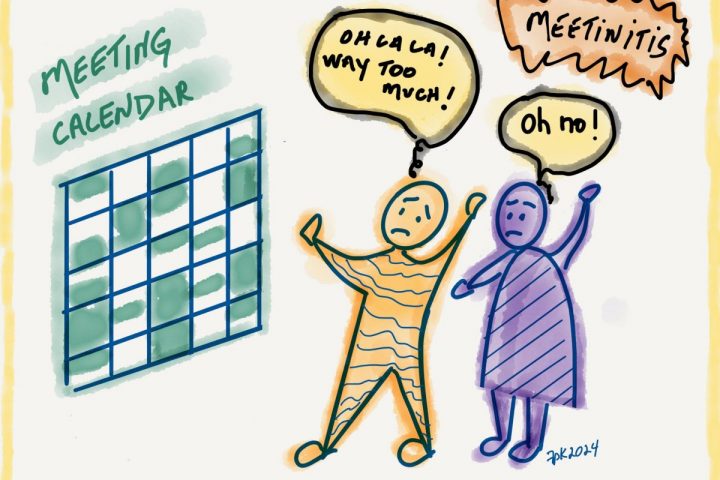[Written by Nathaniel Whitestone, cross posted from the DecisionLab blog]
I am passionate about economic democracy — not so much in the sense of majority rule voting, but in the sense of the people involved in something controlling it together. Some people have argued that, for this purpose, organising as a sociocratic business is better than organising as a co-operative business. Sociocratic businesses allow their members to participate in decision-making regardless of the size of their contribution to the business’s capital; sociocratic businesses do not get torn apart by the Scylla of majority-rule politics or sucked down by the Charybdis of interminable and impotent meetings. However, many co-ops do not suffer from these problems either — and a co-op can remain a co-op while becoming a sociocratic business. The opposition between co-op and Sociocracy is a false one. Let me show you why.
I will assume that you already understand the basics of Sociocracy. If you don’t, that’s okay — visit SociocracyUK to find out more. Come back when you have the basics…
The International Principles of Co-operation are guidelines by which co-operatives put their values into practice. While different co-ops and different co-operative federations have different standards for implementation, all share these Principles. I will go through the Principles and compare each to sociocratic practice.
1st Co-operative Principle: Voluntary and Open Membership
“Co-operatives are voluntary organisations, open to all persons able to use their services and willing to accept the responsibilities of membership, without gender, social, racial, political or religious discrimination.”
In the case of a sociocratic business, “able to use” and “willing to accept responsibilities” implies a respect for the appropriate size of the business — one responsibility of membership might be accepting that the community has an ideal size given particular number of customers or size of facilities. Co-operative businesses and sociocratic businesses are both similarly limited by various bottom lines, including financial ones, and the decision of worker co-operatives to hire or not is a perfect example of such an appropriate exercise of judgment. Residency in a shared (co-operatively-owned) house is another example where a community must wisely judge appropriate size and personal fit without discriminating on the various grounds that would be inappropriate. Wise worker co-operatives give special care to hiring only those people with whom they wish to share their working lives over the long term. A sociocracy can adopt this principle and apply it in the same way that any wise co-operative can.
2nd Co-operative Principle: Democratic Member Control
“Co-operatives are democratic organisations controlled by their members, who actively participate in setting their policies and making decisions. Men and women serving as elected representatives are accountable to the membership. In primary co-operatives members have equal voting rights (one member, one vote) and co-operatives at other levels are also organised in a democratic manner.”
“Vote” must be understood within the context of decision-making by consent; given that commitment, this principle applies. In consent decision-making, a “vote” becomes a voice at the table with the right to with-hold consent based on a “paramount objection”. This is not the same thing as a veto right, because a “paramount objection” may not be arbitrary — it must be based on a threat to the company, or on the inability of the person raising the objection to tolerate the conditions that would be created by a particular decision.
The third sociocratic principle (The Double Link) does not in any way abridge this — it provides a particular form to the pattern of representation in the sociocratic organisation. Because each circle (going upward) consists of people elected by the consent of those below them, the entire hierarchy is elected by consent, in which each participant has one “vote” — or place at the table. Equally, each circle (going downward) is called into being by the one above it. So the smallest sociocracy consists of a single circle that makes its own membership decisions and elects its officers by consent, and a large sociocracy consists of many circles that are invited into membership by the existing sociocratic community, and which each send representatives up the functional hierarchy through elections by consent. The top circle of the company (equivalent to the Board of Directors) consists of some members that it selects and some members that are delegates of the membership as a whole (the General Circle of the company). This is representative democracy by consent, where each member of the General Circle has one voice of equal weight (structurally, though of course some people will be more persuasive than others).
One objection I have heard to sociocratic co-ops is that the “External Experts” on the Top Circle prevent the organisation from controlling itself. This is not correct, as decision-making by consent allows leadership and constraint / control from all participants, regardless of the number of votes they hold. Also, these “External Experts” are equivalent to the voice of non-worker member groups in multi-stakeholder co-ops. Some of those groups may have the permanent right to appoint exchange representatives with a Top Circle; some of them may be invited to do so without immediate reciprocation. In any case, the General Circle of the sociocratic co-op retains the right to appoint members to their Top Circle, and thus their voice cannot be ignored. Given that all of the operations of the sociocratic co-op are controlled as close to the working team as possible, it is also less likely to fall into bureaucratic over-run than most large co-operatives — and therefore it is much more directly controlled by its worker-members than it would be were such control exercised only by majority-rule election of a distant Board.
3rd Co-operative Principle: Member Economic Participation
“Members contribute equitably to, and democratically control, the capital of their co-operative. At least part of that capital is usually the common property of the co-operative. Members usually receive limited compensation, if any, on capital subscribed as a condition of membership. Members allocate surpluses for any or all of the following purposes: developing their co-operative, possibly by setting up reserves, part of which at least would be indivisible; benefiting members in proportion to their transactions with the co-operative; and supporting other activities approved by the membership.”
First of all, even in the narrow sense (of “money” or “the means of production”) most co-operatives in my experience receive different contributions from different members. This may be informal (due to some people donating more tools) or formal (some members buy more shares and/or loan more money to the co-op). Sociocratic companies are no different.
Sociocratic companies do limit the per-share compensation of investor shares, keeping its returns equivalent to a low-yield loan (equivalent to the national bank yield, which will be below high-street bank yields) + a share of surplus equal to that given to workers for their contribution. In a rapidly growing business this makes a sociocratic share worth less than a standard company share but more than a standard “no return” co-operative share. The sociocratic investor share is also more strictly limited than an investment share in a worker co-operative organized according to the articles suggested as models by Co-operatives UK.
The key issue is that membership in a sociocratic company is not dependent on capital investment. Just as co-ops may accept loans from members, or even (in countries where tax laws allow, such as the UK) sell a class of investor shares to members and non-members, so may sociocratic companies. In practice, there is no difference between what a sociocratic co-op may do and what other co-ops may do in this area.
The uses of the surplus in a sociocratic co-operative are consistent with standard co-operative practice.
4th Co-operative Principle: Autonomy and Independence
“Co-operatives are autonomous, self-help organisations controlled by their members. If they enter to agreements with other organisations, including governments, or raise capital from external sources, they do so on terms that ensure democratic control by their members and maintain their co-operative autonomy.”
This is wholly consistent with the sociocratic form, with the understanding that such autonomy is exercised within the limits of interdependence with various stakeholder groups that are invited to contribute representatives to the organization’s Top Circle — as it also would be in a different sort of multi-stakeholder co-op.
5th Co-operative Principle: Education, Training and Information
“Co-operatives provide education and training for their members, elected representatives, managers, and employees so they can contribute effectively to the development of their co-operatives. They inform the general public – particularly young people and opinion leaders – about the nature and benefits of co-operation.”
This is wholly consistent with the sociocratic form.
6th Co-operative Principle: Co-operation among Co-operatives
“Co-operatives serve their members most effectively and strengthen the co-operative movement by working together through local, national, regional and international structures.”
This is wholly consistent with the sociocratic form.
7th Co-operative Principle: Concern for Community
“Co-operatives work for the sustainable development of their communities through policies approved by their members.”
This is wholly consistent with the sociocratic form.
In short, sociocratic co-operatives may be exceptional, but they fall well within the bounds of good practice for both co-ops and sociocratic organizations. Sociocracy offers co-operatives a structured way to integrate consensus decision-making and self-governing teams throughout the mutually-owned organisation. And co-operatives offer sociocratic businesses a powerful global network of alliances and co-operating industries. I, for one, am glad to be working for a sociocratic co-operative.



